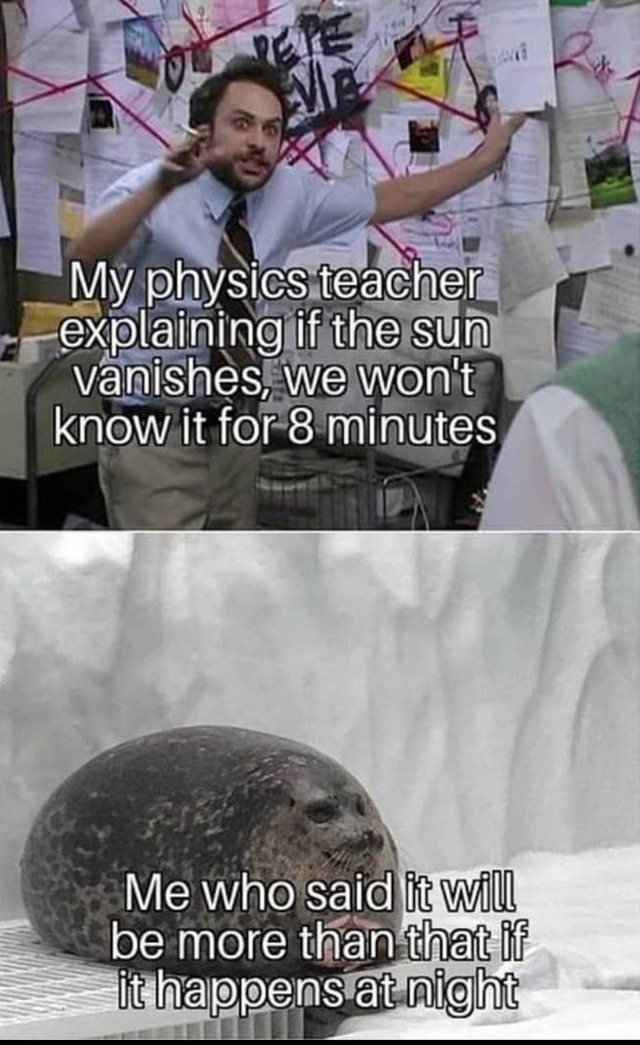All we can see is 8 minutes into the sun's past.
Science Memes
Welcome to c/science_memes @ Mander.xyz!
A place for majestic STEMLORD peacocking, as well as memes about the realities of working in a lab.

Rules
- Don't throw mud. Behave like an intellectual and remember the human.
- Keep it rooted (on topic).
- No spam.
- Infographics welcome, get schooled.
This is a science community. We use the Dawkins definition of meme.
Research Committee
Other Mander Communities
Science and Research
Biology and Life Sciences
- !abiogenesis@mander.xyz
- !animal-behavior@mander.xyz
- !anthropology@mander.xyz
- !arachnology@mander.xyz
- !balconygardening@slrpnk.net
- !biodiversity@mander.xyz
- !biology@mander.xyz
- !biophysics@mander.xyz
- !botany@mander.xyz
- !ecology@mander.xyz
- !entomology@mander.xyz
- !fermentation@mander.xyz
- !herpetology@mander.xyz
- !houseplants@mander.xyz
- !medicine@mander.xyz
- !microscopy@mander.xyz
- !mycology@mander.xyz
- !nudibranchs@mander.xyz
- !nutrition@mander.xyz
- !palaeoecology@mander.xyz
- !palaeontology@mander.xyz
- !photosynthesis@mander.xyz
- !plantid@mander.xyz
- !plants@mander.xyz
- !reptiles and amphibians@mander.xyz
Physical Sciences
- !astronomy@mander.xyz
- !chemistry@mander.xyz
- !earthscience@mander.xyz
- !geography@mander.xyz
- !geospatial@mander.xyz
- !nuclear@mander.xyz
- !physics@mander.xyz
- !quantum-computing@mander.xyz
- !spectroscopy@mander.xyz
Humanities and Social Sciences
Practical and Applied Sciences
- !exercise-and sports-science@mander.xyz
- !gardening@mander.xyz
- !self sufficiency@mander.xyz
- !soilscience@slrpnk.net
- !terrariums@mander.xyz
- !timelapse@mander.xyz
Memes
Miscellaneous
What if I have a flashlight and am underground?
In about 8 minutes and 20 seconds, we would lose the Sun’s gravitational force. Namely, gravitational waves travel at the speed of light (186,000 miles per second or 299,000 kilometers per second). This also means that we would be in complete darkness 8 minutes after the Sun disappears
https://curiousmatrix.com/what-would-happen-if-the-sun-disappeared/
What I wanna know is if gravitational waves travel at the speed of light all the time or are they influenced by media like light.
I’m 0% an expert in this, but I think they move at light speed all the time. Light is “affected” by mass only indirectly, since the light travels in a straight line through local space but space itself is curved by the mass.
Light gets caught up in mediums because those mediums have electric fields (the electrons for matter, or light itself when interfering). Thus, gravity waves will be slowed by gravity fields, like planets, stars, and galaxies.
What waves interact with also depends on the wavelength, like how radio waves can bounce off Earth's ionosphere, but can ignore the atoms in the walls of your house. There are plenty of very large gravity waves from merging black holes and neutron stars, and those pass right through Earth. Smaller gravity waves (like from a collapsing or disappearing star) could interact with other stars, possibly reflecting off of star clusters, or even refracting through like glass if the distances were regular and the waves just the right length.
Those waves would also be delayed, just like light in glass, air, or water. Interestingly, even light still moves through these mediums at light-speed, but all it's energy moves slower. If you had a sensitive enough detector you could see heavily attenuated light that didn't slow down.
